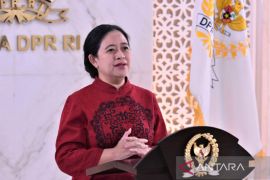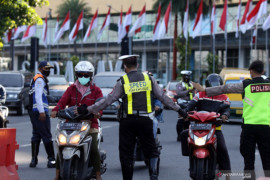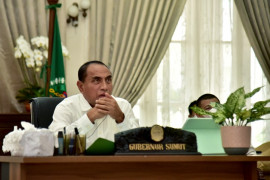Perppu No.2/2017 does not target any particular religion or organization. It is (issued) as part of the state`s obligation to protect the state`s sovereignty based on Pancasila and the 1945 Constitution," Tjahjo Kumolo said..Jakarta (ANTARA News) - The governments step to issue a Government Regulation in Lieu of Law (Perppu) to deal with mass organizations, which were considered to be against the countrys Pancasila ideology, has received mixed reactions.
On July 12, 2017, Coordinating Minister for Political, Legal and Security Affairs Wiranto announced the issuance of Perppu N0. 2 Year of 2017 on Amendment of Law No. 17 Year of 2013 on Mass Organizations (Ormas).
The Perppu was issued to prevent the emergence of mass organizations, which are opposed to Pancasila and the 1945 Constitution, and to provide legal basis for the government to dissolve such a negligent organization.
However, apart from those who supported the governments step, some others criticized it. Therefore, the government on Saturday (July 15), through Home Affairs Minister Tjahjo Kumolo, explained that it has strong reasons to issue the Perppu.
"The government has three main considerations for issuing the Perppu. By issuing the Perppu, the governments policy will be in line with the decision of the Constitutional Court Number 138 / PUU-VII / 2009, which suggests that such a Perppu could be issued based on the existence of a compelling situation to solve legal problems quickly based on the law," Kumolo stated.
Thus, according to Kumolo, the Perppu can be issued if the absence of legal provisions could not be overcome and a new law could not be produced quickly.
"The existing legal regulation is insufficient," the minister noted.
Furthermore, the process of drafting Perppu 2/2017 also involves many parties.
"Among them were the government, lawyers, academics, religious leaders, customary leaders, community leaders, and other parties," he explained.
Furthermore, Kumolo asserted that Perppu No.2/2017 does not target any particular religion or organization.
"But it is (issued) as part of the states obligation to protect the states sovereignty based on Pancasila and the 1945 Constitution," added Tjahjo.
According to the minister, the government is currently preparing concrete steps to implement Perppu No. 2/1017 without exerting the repressive way as rumored of late.
"The government team, chaired by the chief minister for political, legal and security affairs, has been working and collecting information related to mass organizations, which have violated the regulations," he explained.
He revealed that if the mass organizations which violate the rules have legal foundation permits, then their permits will be revoked. In the meantime, if mass organizations which commit violations have no legal foundation permits, then their registration certificates will be revoked.
The government is also currently preparing materials to be submitted to the House of Representatives in order to legalize the Perppu.
"Hopefully, the House can approve and enact the Perppu into law," Kumolo stated.
However, according to the National Mandate Party (PAN), there is no need to issue a Perppu on mass organization. PAN noted that the government does not need to issue a Perppu on Mass Organizations since they have already been regulated in detail in a law.
"PAN has never been invited to discuss the issuance of the Perppu despite the fact that it is also a member of the government coalition. But if any suggestions are sought from PAN, we do not think it should be issued now," PAN politician Yandri Susanto noted at a discussion in Jakarta on Saturday.
Susanto said that Law No. 17 of 2013 came into effect less than four years ago. Several parties were involved in its deliberations, thereby taking a long period of time and large amount of funds.
"If we carefully read the law on mass organizations, we will see that it has regulated vast details, such as on how to establish a social organization, how to fund it, and how to handle matters if it has to be given a sanction, to be taken to court," he remarked.
The same view is also expressed by Deputy House Speaker Fadli Zone.
"No one has voiced a compelling urgency. If a survey is conducted on it, there must be many people who will surely reject it (the issuance of a perppu on mass organizations)," the deputy House speaker noted here on Saturday.
Speaking at a discussion regarding Perppu on mass organizations, Zon remarked that the compelling crunch now is on how to provide jobs for unemployed people and overcome the difficulties faced by the people.
Zon pointed out that the issuance of a Perppu is a new form of dictatorship, as he believes that the establishment of a mass organization is guaranteed by the Constitution and is regulated by the law.
On the discourse of the liquidation of the Hizbut Tahrir Indonesia (HTI) organization, Zon emphasized that the HTI has tendered an explanation to the House of Representatives that it continues to support the state ideology of Pancasila, the Unitary State of Indonesia, and the diversity of the country. "Hence, there is no question about the HTI," he added.
In the meantime, The Indonesian Muslim Student Movement (PMII), Mamuju branch, West Sulawesi Province, has expressed its support towards the issuance of the Perppu.
"PMII Mamuju has stressed its supports towards the issuance of the Perppu on mass organizations. This is the attitude of PMII at the national level ", Chairman of PMII Mamuju, Wais Walkoni, said in Mamuju on Friday.
He stated that the PMII has considered the Perppu to be a concrete and constitutional legal step of the government in dissolving mass organizations that are considered a threat to the existence of Pancasila, the 1945 Constitution, and the Unitary State of the Republic of Indonesia (NKRI).
According to him, the government should provide a sense of security, comfort, and legal certainty in order to maintain the principles, values, and goals of the Unitary Republic of Indonesia.
"Some 250 thousand mass organizations in Indonesia have all been given the freedom of assembly and association without exception, provided that they are not against the Pancasila state ideology," he added.
Therefore, if there are organizations that threaten the nations ideology and the Constitution of the country, then they should be dissolved, he noted.
"Students and community leaders must work together to protect Indonesia from radicalism and intolerance that threaten the integrity of the state," he remarked.(*)
Reporter: Andi Abdussalam
Editor: Heru Purwanto
Copyright © ANTARA 2017











